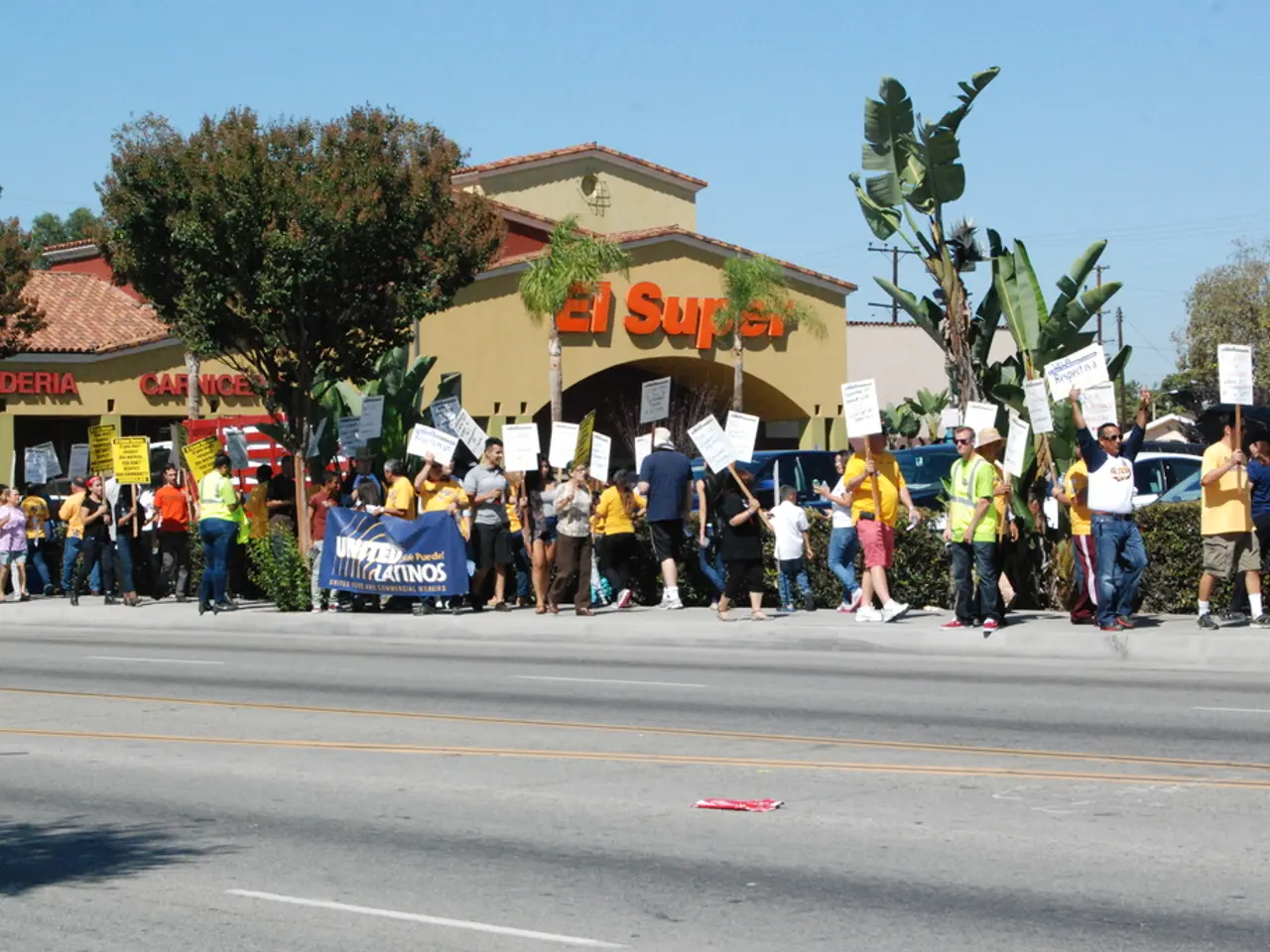In Venezuela, a pro-government coalition triumphs in the mayoral elections, while the opposition maintains its strongholds.
In the recent municipal elections held in Venezuela on July 27, 2025, the ruling United Socialist Party of Venezuela (PSUV) emerged as the clear winner, securing a dominant victory in a majority of the municipalities.
The elections, which took place alongside the National Popular Consultation, allowed communities to discuss local priorities and vote on project proposals, saw the PSUV win approximately 285 of the 334 to 335 mayoral positions. This represents around 85% of the municipalities, a significant increase from the 212 mayoralties won by the pro-government alliance in 2021.
The elections were marked by low voter turnout relative to previous cycles, with reports indicating approximately 6.27 million voters participated, representing around 29% of the electorate. However, some reports suggest turnout was closer to 44%.
Opposition parties maintained control over a small number of municipalities, primarily in areas like East Caracas, but they did not participate as a united coalition this year. The opposition has been critical of the National Electoral Council (CNE) for not publishing sufficiently detailed polling data and has questioned the legitimacy of the election results amid ongoing disputes following the controversial 2024 presidential election.
President Nicolás Maduro forecasted that the ruling coalition would finish with around 285 mayor posts, calling it a "historic victory for the Bolivarian Revolution." The pro-government alliance also secured 23 out of the 24 state capitals, with San Carlos in Cojedes being the only exception.
The elections also featured the first National Popular Youth Consultation, enabling youth participation in community project voting, a notable development in citizen engagement. Some of the common project proposals included sports and recreation facilities and economic endeavors.
In addition, the GPP won overwhelming majorities in municipal assemblies, with 2,402 local councillors being elected. Indigenous communities will choose an additional 69 local legislators according to their traditions.
The opposition Vamos Vamos Cojedes party is expected to govern all nine municipalities in the state of Cojedes, a rural state that was once a Chavista bastion but has become one of the opposition's main footholds in the country.
Anti-government alliances managed to retain their traditional strongholds in the wealthy East Caracas municipalities. Notable opposition politicians such as Gustavo Duque and Darwin González from Fuerza Vecinal will get new four-year terms as Chacao and Baruta mayors, respectively.
President Maduro invited opposition politicians to "work together for peace, democracy and national coexistence." Despite the persistent opposition discontent and low electoral participation, the PSUV consolidated its municipal control with a broader margin than in recent comparable elections.
- The record-breaking victory of the PSUV in the Venezuelan municipal elections has sparked discussions about migration, as some predict an exodus of opposition supporters seeking better opportunities abroad.
- In the realm of education-and-self-development, there's a growing interest in personal-growth programs, particularly mindfulness techniques, as a means of coping with the stress surrounding war-and-conflicts and politics.
- Productivity at workplaces has been somewhat affected by the election results, as employees grapple with the uncertainties of policy-and-legislation changes that may follow.
- Career-development workshops are experiencing a surge in demand, with people seeking to upgrade their skills in anticipation of job-search opportunities in a changing job market.
- General-news outlets reported a surge in car-accidents on election day, attributed to high excitement and confusion.
- The politics of the election have cast a shadow over the joy of sports fans, with football, basketball, baseball, hockey, golf, racing, and mixed-martial-arts tournaments receiving less attention than usual.
- Nevertheless, the Champions League, Premier League, NBA, NCAABasketball, MLB, NHL, Laliga, grand-prix, horse-racing, and tennis tournaments continue, though sports-betting websites are experiencing a drop in traffic due to election-related uncertainty.
- Some European leagues have expressed concerns about the impact of the political climate on sports Exchange programs.
- The election results have not been without controversy, with crime-and-justice discussions arising due to accusations of vote-rigging and fraud.
- Accidents, fires, and severe weather conditions caused by climate change have taken a backseat in the overall news coverage, yet they remain pressing issues for weather-forecasting and emergency response teams.
- Learners in online-education platforms are grappling with the challenge of balancing their studies with the distractions of the election, while also engaging in goal-setting for lifelong-learning.
- Skills-training programs are considering offering specialized courses in election management and political analysis to meet the growing demand for such skills.
- The election results serve as a case study for sports-analysis experts seeking to understand the dynamics of public opinion and political persuasion.
- Weather-forecasting models are predicting a tumultuous season ahead, with fires, storms, and hurricanes potentially disrupting the rebuilding efforts post-election.
- Learning opportunities are now available in a variety of areas, from technology and finance to sports and arts, reflecting the importance of continuous learning and adaptation in the modern world.
- The political landscape is expected to shape future policy-and-legislation decisions affecting various sectors, including education, economy, and social services.
- The election results have reignited debates about the role of external intervention in local conflicts, emphasizing the need for comprehensive conflict resolution strategies and peacebuilding efforts.
- In the aftermath of the election, civic engagement programs are encouraging citizens to participate in community projects, focusing on sports facilities, economic endeavors, and volunteer activities.
- Auto-racing events have been cancelled due to safety concerns, as race tracks have been used as temporary polling stations and voting centers.
- Mixed-martial-arts organizations are considering relocating their events outside Venezuela, citing the current political instability and potential risks involved in hosting large-scale events.
- Indigenous communities are seeking to strengthen their participation in policy-and-legislation decisions, ensuring their unique perspectives are considered in the development of community projects and programs.
- As the nation moves forward, there is an increased emphasis on fostering a culture of innovation, collaboration, and mutual understanding in the pursuit of a sustainable, peaceful future.




